AI and Next Frontiers of Innovation: The 2025 Watchlist
30 December, 2024
AI stands at the heart of a global evolution, redefining innovation, operations, and growth across industries. The global AI market is projected to surpass $826 billion by 2030 (NASDAQ), underscoring its rapid integration across sectors. As we move into 2025, the narrative shifts from adoption to transformation—leveraging AI not just for efficiency but as a force for ethical, scalable, and sustainable impact. This shift highlights AI as a defining technology trend reshaping the future of business and society.
Top-performing companies are 2x more likely to realize value from generative AI than their peers, highlighting the benefits of embedding AI intrinsically into their operations (PwC). With 46% of executives prioritizing differentiation through Responsible AI practices (PwC Responsible AI Survey), the next frontier lies in driving innovation while fostering trust and accountability.
This blog uncovers the top tech trends in AI leading this charge, offering insights into how businesses can embrace innovation responsibly to thrive, build trust, and shape the future with purpose across industries in 2025.
Top Strategic Tech Trends in AI for 2025
1. Multimodal AI: The Next Leap in Contextual Intelligence
2025 marks a transformative year for enterprise AI as multimodal AI takes center stage, with the global market projected to reach $2.4 billion this year and grow to a staggering $98.9 billion by 2037 (Google Cloud). By integrating diverse data sources—images, video, audio, and text—this technology mirrors human learning, enabling contextual awareness and delivering more precise, customized outputs.
Businesses are harnessing multimodal AI to break down silos between data types, offering insights that improve diagnostic accuracy, reduce supply chain inefficiencies, and boost customer engagement metrics by up to 80% (Cambridge Service Alliance).
As one of the leading trends in technology, multimodal AI is transforming how industries leverage data for actionable insights. Unlike traditional AI models that rely on single data types, multimodal AI's ability to process diverse data streams simultaneously ensures richer contextual insights, making it a cornerstone for industries like healthcare, logistics, and retail.
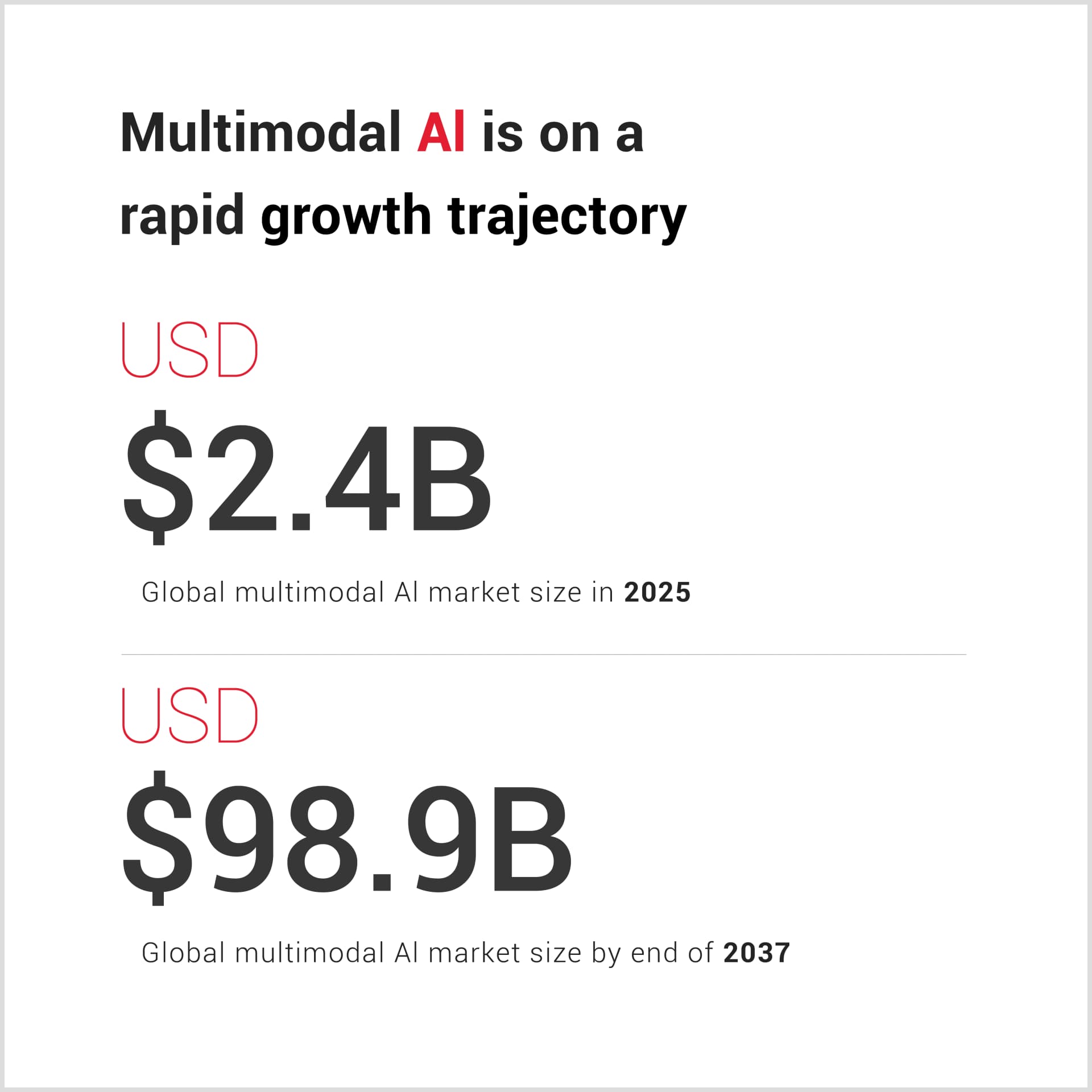
2. Assistive AI Search: Redefining the Future of Knowledge Work
The enterprise search market is projected to reach $12.9 billion by 2031 (Coherent Marketing Insights), driven by AI-powered assistive search systems that shift from retrieving to creating knowledge.
These systems are among the latest tech trends, enhancing productivity by reducing downtime and improving workflow efficiency. They integrate diverse datasets to deliver actionable insights, improving diagnostics in healthcare, fraud detection in finance, and inventory management in retail.
In manufacturing, they optimize supply chains, while in legal, they accelerate contract analysis and research. By addressing industry-specific challenges, these tools transform decision-making and operational efficiency.
Assistive AI search transforms static knowledge bases into dynamic, actionable tools. Unlike standard search systems, it uses multimodal capabilities—images, audio, video, and conversational prompts—to provide not just information but intuitive, actionable insights that adapt to real-world contexts.
3. Customer Experience 2.0: Redefining Engagement with AI
AI-powered customer experience leverages a combination of Generative AI, Machine Learning (ML), and Agentic AI to transform how businesses engage with customers, making interactions seamless and hyper-personalized. 55% of organizations prioritize AI-driven customer service initiatives, while 70.7% of executives rate internal assistance as a top CX use case (Gartner). AI solutions deliver consistent omnichannel support, analyze customer sentiment in real-time, and enable self-service options with intuitive, personalized search results.

AI-powered CX systems transform engagement by using Generative AI for dynamic, human-like interactions, ML for real-time personalized recommendations, and Agentic AI for autonomous self-service solutions. As one of the latest technology trends 2025 in AI, these systems are reshaping industries like telecom, retail, and insurance, delivering faster issue resolution, tailored experiences, and automated claims processing, driving customer satisfaction and retention.
Unlike traditional CX tools, AI-powered systems blend real-time insights and autonomy to deliver consistent, hyper-personalized experiences, setting a new standard for customer engagement.
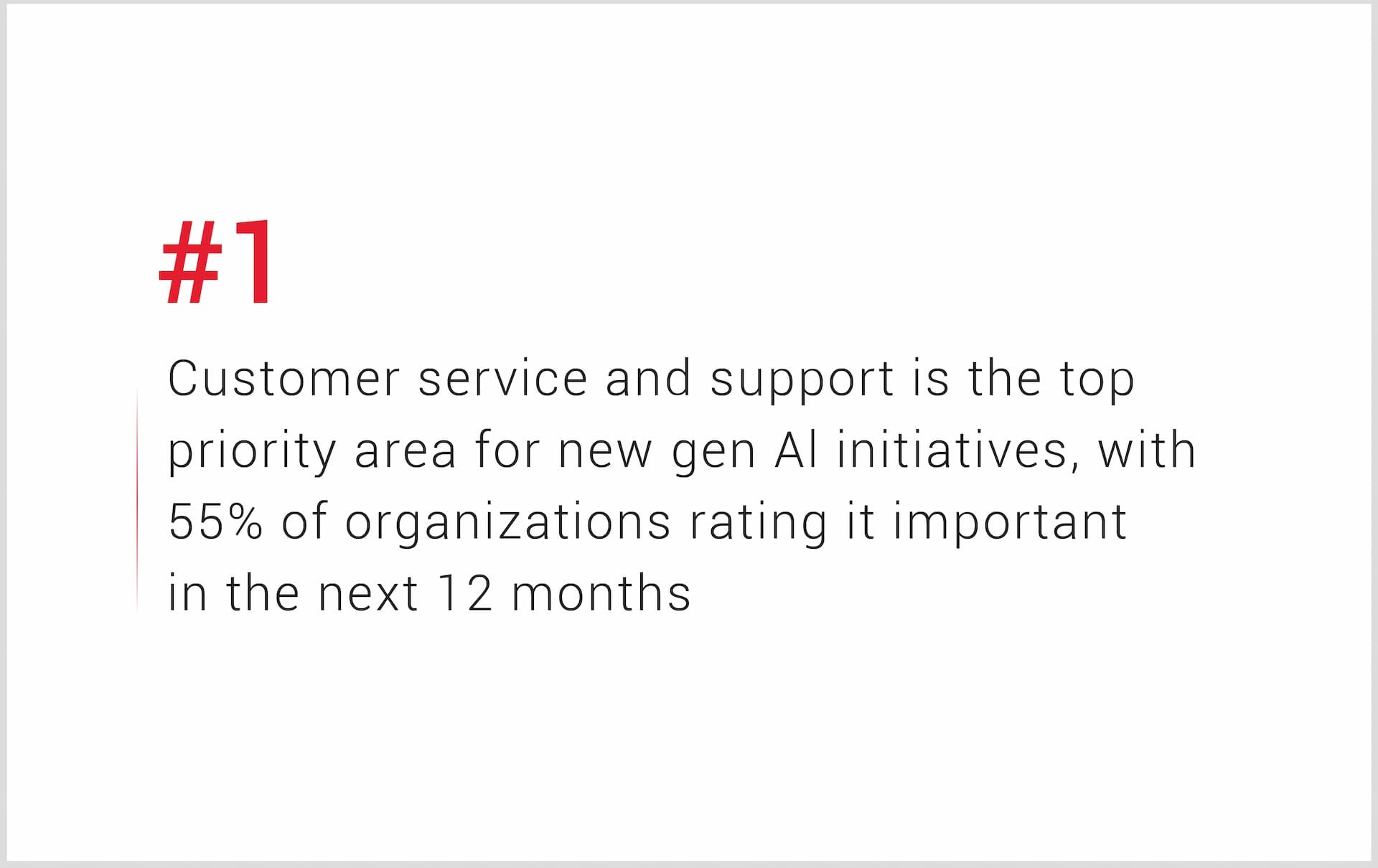
4. Agentic AI: From Simple Chatbots to Dynamic Multi-Agent Systems
By 2028, 15% of daily work decisions will be made autonomously through Agentic AI, a significant leap from 0% in 2024 (Gartner). AI agents have evolved from basic chatbots into intelligent, autonomous systems capable of reasoning, planning, and memory.
Multi-agent systems, part of the latest technology trends, streamline decision-making and enhance collaboration across industries.These systems optimize complex workflows across industries, from route planning for timely deliveries in logistics to improving resource allocation and project timelines in construction. Healthcare leverages AI agents for patient management and workflow optimization, and the oil and gas sector benefits from predictive maintenance and pipeline monitoring, reducing risks and downtime.
Unlike single function chatbots, multi-agent systems leverage reasoning, memory, and planning to autonomously handle complex, dynamic workflows. This positions them as a game-changer in industries with high operational complexity, such as oil and gas.
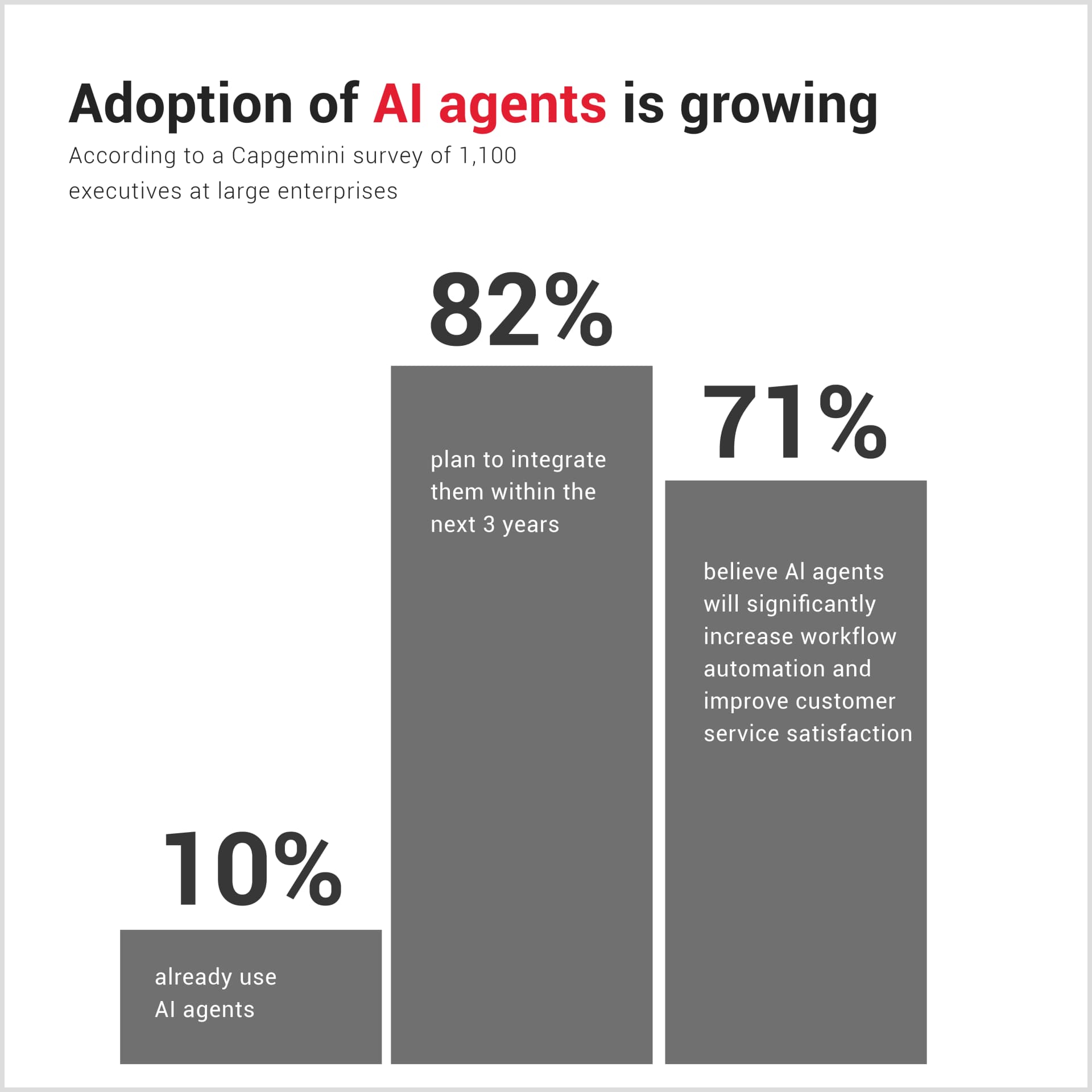
5. AI-Driven Cybersecurity: Redefining Digital Defense
2025 marks a revolutionary year for cybersecurity as AI redefines how organizations protect against digital threats. As one of the most critical tech trends, AI-powered solutions are transforming traditional defenses, enabling real-time threat detection, automated response systems, and advanced risk mitigation strategies.
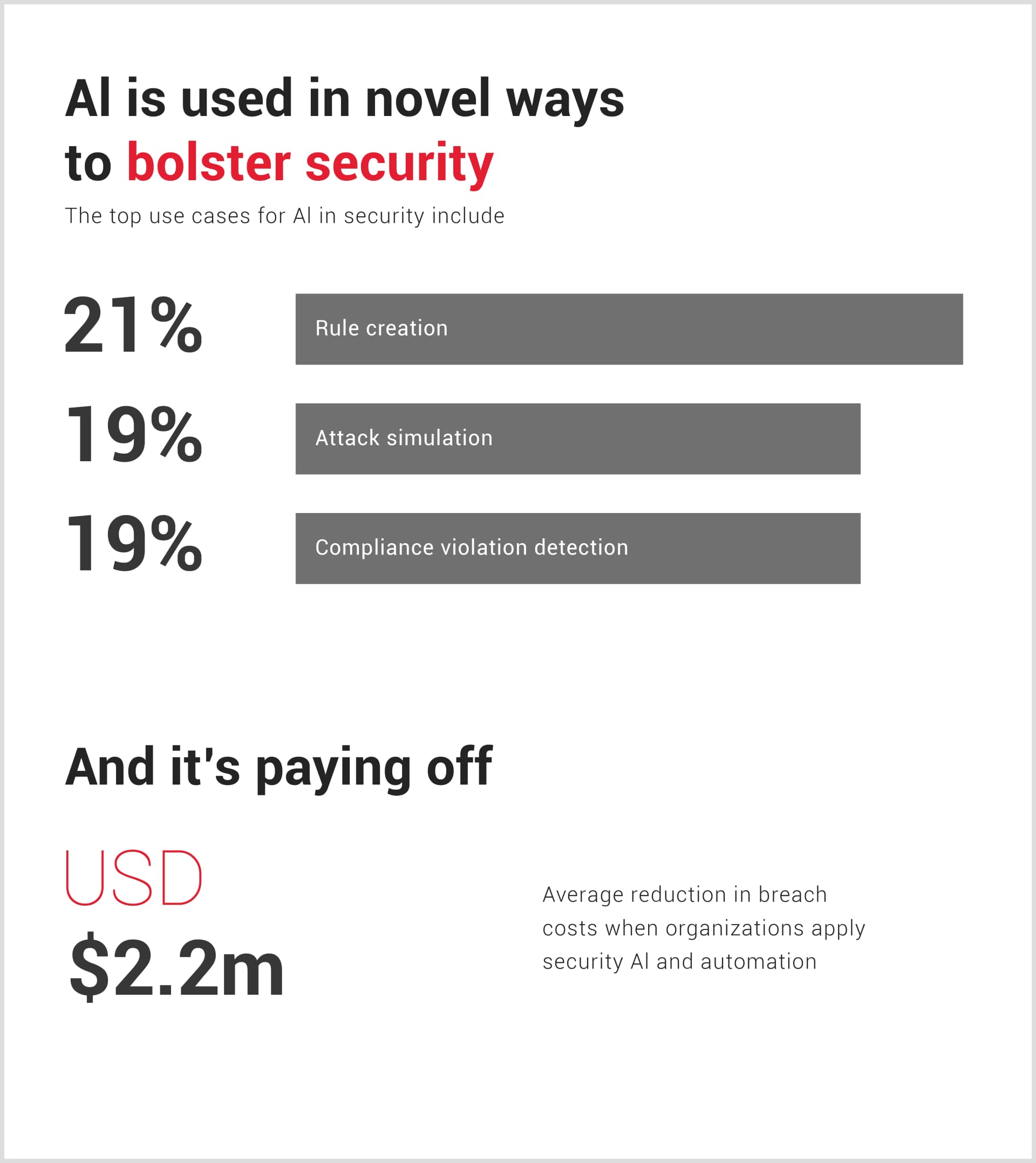
With the global cost of data breaches reaching $4.88 million in 2024, the urgency to adopt AI-powered defenses has never been greater. By addressing vulnerabilities proactively, AI has become a game-changer, with businesses saving an average of $2.2 million in breach costs through automation (IBM).
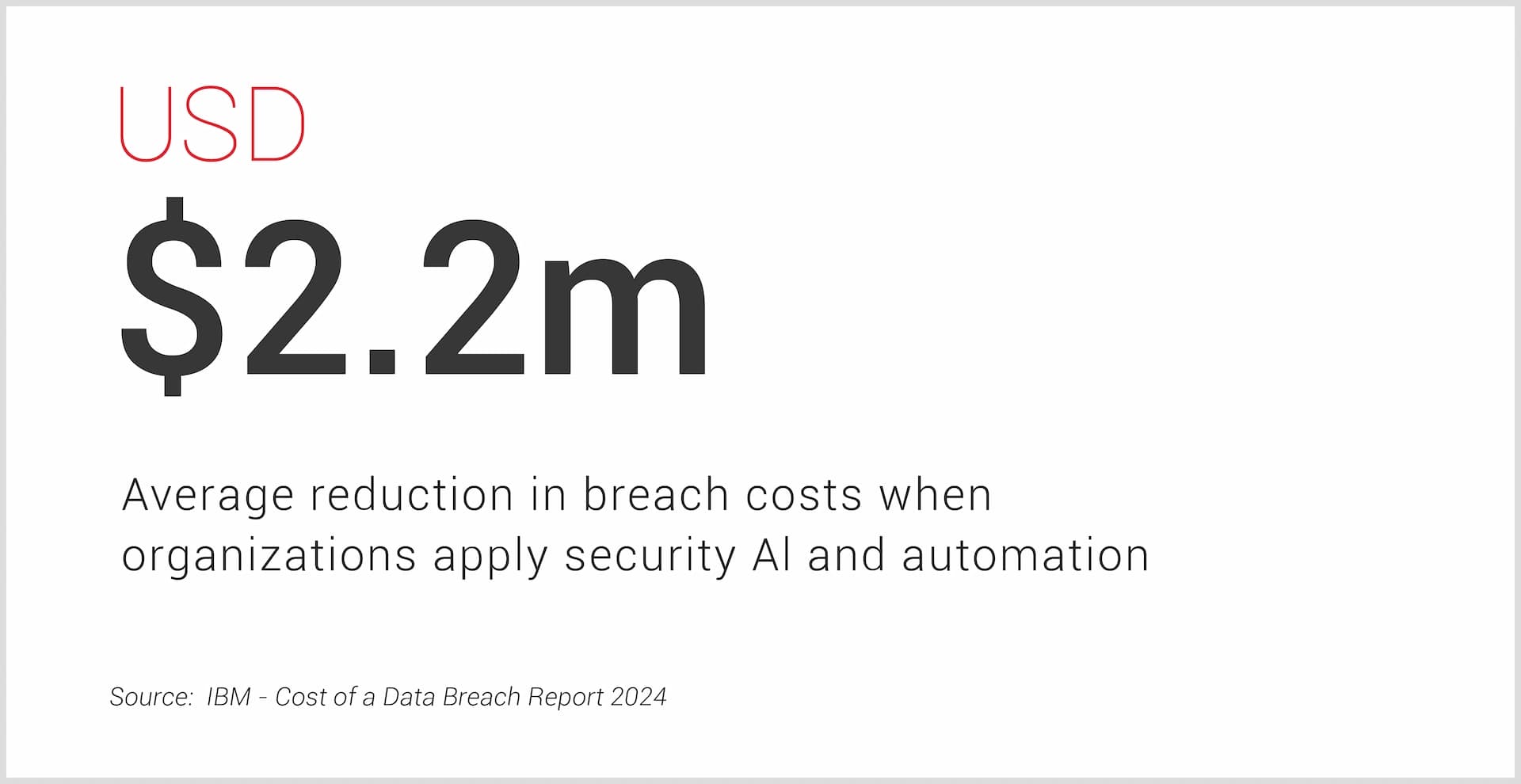
As one of the top tech trends 2025, AI-powered cybersecurity tools detect threats faster than traditional methods and reduce response times. This real-time detection capability is essential for industries like finance and manufacturing, which are prime cyberattack targets.
Unlike reactive security measures, AI-driven cybersecurity solutions proactively identify vulnerabilities and predict potential threats using advanced analytics and machine learning. This ensures a robust defense against evolving threats like automated phishing and edge-platform exploitation.
6. AI Governance: Bridging Innovation and Responsibility
AI governance platforms are transforming how organizations ensure responsible and ethical AI usage. By 2028, enterprises with strong AI governance will achieve 30% higher customer trust ratings and 25% better regulatory compliance scores than competitors (Gartner).
Governance frameworks reduce compliance violations, enhance transparency in AI decision-making, and mitigate bias in algorithms. Unlike ad hoc regulatory efforts, AI governance platforms provide a structured approach to managing reliability, transparency, and accountability, ensuring AI aligns with both business goals and societal expectations.
7. Green AI: Innovating Sustainably, Scaling Responsibly
As AI adoption accelerates, balancing innovation with sustainability has become a top priority. In 2022, data centers accounted for 1-1.5% of global electricity, a figure expected to rise to 3.2% of global carbon emissions by 2025 (International Energy Agency). Around 50% of this energy powers cooling systems and backup operations, making efficiency a top priority (World Economic Forum).
AI-driven optimizations like intelligent cooling and dynamic workload management are reducing energy usage. Additionally, 63% of top-performing companies are increasing cloud budgets to leverage generative AI, with 34% citing sustainability considerations as a key driver (PwC’s 2024 Cloud and AI Business Survey)
Innovations in materials, such as gallium nitride (GaN) semiconductors, further enhance efficiency. If U.S. data centers adopted GaN, they could save 3.85 TWh of energy annually, cutting 3.15 million tons of CO2 emissions (World Economic Forum).
Green AI demonstrates that sustainability and innovation can thrive together, enabling enterprises to scale responsibly while reducing their environmental footprint.
Wrapping up
The future of AI is unfolding rapidly, with latest tech trends reshaping industries at an unprecedented pace. To remain competitive, enterprises must adapt by embracing innovation that delivers measurable impact, enhances trust, and drives sustainable growth.
At CodeNinja Inc., we believe in harnessing the transformative power of AI to empower enterprises in making a true, measurable impact. Guided by our commitment to ethical innovation, we partner with businesses to co-engineer AI-driven solutions that revolutionize operations, drive sustainable growth, and shape a future defined by purpose and progress. The time to act is now—step into the future with AI solutions that empower, inspire, and transform.
Explore How We’re Shaping the Future—Visit Us
.jpg&w=256&q=75)
Zobaria Asma
Asst. Manager Brand & Communications
Zobaria serves as the Asst. Manager Brand & Communications at CodeNinja, driving brand strategy and communication efforts across diverse global markets, including APAC, LATAM, and MENA. With over 5 years of experience in scaling businesses, she brings expertise in SaaS branding and positioning. Her expertise spans a range of sectors, ensuring that CodeNinja's messaging resonates with diverse audiences while reinforcing its leadership in hybrid intelligence, AI-driven innovation, and digital transformation.
